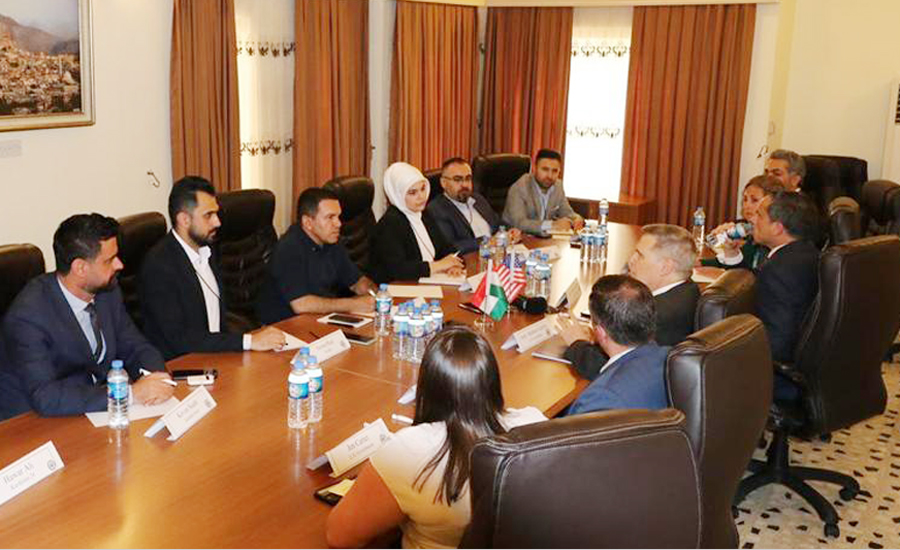The United States Ambassador to Iraq Matthew Tueller said the issue of armed groups and militias in the disputed territories and particularly in Shingal (Sinjar) requires “a very wise political handling of the issues when you have groups become so entrenched within the economic and security institutions and have their own weapons.”
The US ambassador to Iraq said this in response to a question by Salam Omer, editor-in-chief of KirkukNow, in an open discussion organized by the US embassy in Erbil on Sunday for a number of media outlets in Erbil.
At the meeting, attended by Robert Palladino, the Consul General of the US in Erbil, Ambassador Tueller discussed the US strategic relations with Iraq, as well as the Iranian government's interference in Iraq's affairs through assistance to armed groups.
The issue of armed groups and militias requirer a very wise political handling of the issues
In the discussion, Tueller presented his proposals and recommendations regarding the current situation in the disputed territories which extend from Khanaqin district of Diyala province, northeast of Baghdad on the border with Iran, through the northern, oil-rich city of Kirkuk up to Shingal in the west at the borders with Syria and the Ninewa Plains, following the latest clashes which has caused reversed displacement for over 4,000 Ezidi returnees from Shingal to the camps for the internally displaced persons IDPs in Duhok Northern province.
"The disputed territories is an issue have been left unresolved according to the constitutional process for a number of reasons … the effect of ISIS emergence in these areas, but the same time we feel the need for renewed sense of political will and commitment to resolve issues like the disputed territories, which encompasses the whole range of issues like economic, security and political as well.”
“Those are issues for the Iraqi people to resolve within the framework of the constitutional process.”
Article 140 of the Iraqi constitution endorsed in 2005 stipulated a three-stage process of normalization, a population census and a referendum on the status of the territories in order to put an end to the dispute over these areas between the Kurdistan Regional Government KRG in Erbil and Iraqi Federal government in Baghdad.
Erbil, May 15, 2022: US Ambassador to Iraq Matthew Tueller holds an open discussion with representatives of a number of media outlets. US consulate, Erbil
"For the issue of the militias, no state can be a normal state where you have weapons and armed groups that are outside of the authority and control of the state, this is highlighted and has been going in Sinjar for some time,” he added.
At present, the Iraqi government considers the implementation of the terms of the 2020 Shingal agreement concluded between the Baghdad and Erbil the only way to resolve the Shingal issue, which stipulates the need for aremd groups, mainly those affiliated to Kurdistan Workers’ Party PKK, fighting Turkey for decades and holding territories in Iraq, to evacuate their headquarters in Shingal, but the agreement has not been implemented so far.
In the Ezidi-dominant region of Shingal, only three thousand square kilometers, Baghdad federal and Erbil regional governments compete to establish their rule following the claimed defeat of IS in 2017: three local administrations want to administer the war-torn district where eight armed groups and forces are deployed including the Iraqi security and military forces.
“This phenomenon existed prior to ISIS, but when ISIS came, under the cover of the Popular Mobilization Forces (PMF), many of these previously existing militia forces have sought legitimacy of coming under the institutions and the state."
"Ultimately, this is something that will have to be addressed by Iraq. It has going to require probably very wise, political handling of the issues especially when you have groups that have become so entrenched within the economic and security institutions and have their own weapons," Tueller said.
According to the agreement concluded on May 3rd , following armed clashed between the Iraqi army and the pro-PKK Shingal Resistance Units Yabasha (YBS) which has cause casualties in both sides, the commanders of both sides have decided to ceasefire and resume talks next week. However, the statement by the Iraqi army emphasized that only the Iraqi forces will stay in the district, without any reference to ceasefire agreement with the YBS.
"Although the commander-in-chief of the Iraqi armed forces insisted on implementing the (Sinjar) agreement, all the forces there do not belong to the Iraqi security institutions, some of them are PMF, or armed groups or militias. There should not be any armed elements that are not under the control of the state so both the federal and regional governments must work hard to bring this under their control,” the US ambassador affirmed.
"I don't think the US intervention in this issue is useful, but the Iraqis themselves should solve it, who know that this issue is like a bomb that must be defused very, very, very carefully.”

Alina Romanowski, a 40-year-old diplomat, will replace Tuller as US ambassador to Iraq early June.
Tueller also expressed the US government's expectations for the formation of a new Iraqi government to improve cooperation and bilateral relations.
"Of course, everything good must come to an end, but I am very sure that the person who will take over after me and the teams working here in Erbil and Baghdad will not delay."
"We are here and we will not go anywhere else," the ambassador concluded.





